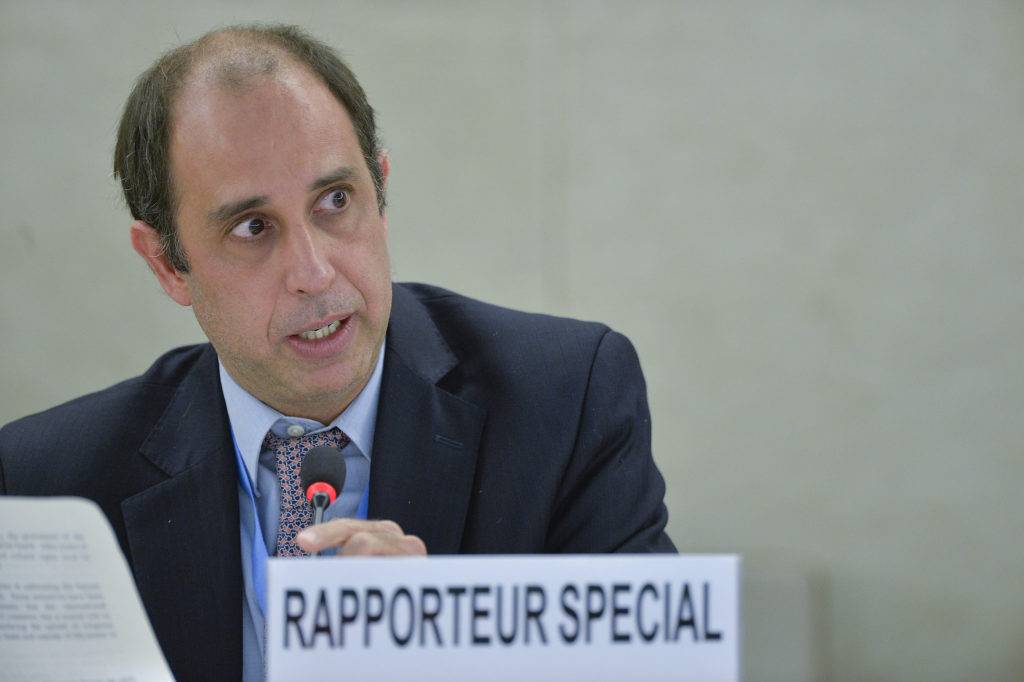
Tomas Ojea Quintana, tidigare specialrapportör för situationen för mänskliga rättigheter i Burma, är juridiskt ombud för de organisationer som driver rättsprocessen i Argentina. Foto: UN Photo, Jean-Marc Ferré, Creative Commons
Gemensamt uttalande från det Europeiska Burmanätverket 18 juni 2020
Uttalande, Stockholm, 18 juni 2020
I Argentina har ett antal civilsamhällesorganisationer gått samman och uppmanat en domstol att inleda en utredning mot militära och civila ledare i Burma om deras roll i övergrepp som begåtts mot rohingyer. Principen om universell jurisdiktion gör det möjligt att i vilket land som helst utreda individer som misstänkts ha begått de grövsta internationella brotten, såsom folkmord, krigsbrott och brott mot mänskligheten, oavsett i vilket land brotten begåtts. Det är dock inte alla länder som har universell jurisdiktion inskrivet i sin nationella lagstiftning och ett uppbyggt system för att inleda sådana utredningar.
I Argentina är det dock möjligt och i november 2019 lämnade organisationerna in en ansökan om att en utredning skulle inledas. Redan i december meddelade dock en domstol att en utredning inte borde inledas eftersom det redan pågick en liknande process vid den Internationella brottmålsdomstolen i Haag (ICC). Det beslutet överklagades och nyligen i kom beskedet från en högre instans i Argentina att en formell begäran om information om ICC:s utredning måste göras innan ett beslut kan tas om huruvida domstolen i Argentina ska gå vidare med ärendet.
För att uppmärksamma detta och visa sitt stöd för en rättsprocess i Argentina gjorde medlemmar i det Europeiska Burmanätverket ett gemensamt uttalande den 18 juni. Läs uttalandet i sin helhet nedan eller som PDF via den här länken.
Statement by members of the European Burma Network
18 June 2020
EBN welcomes prospect of continued Argentinian investigation into atrocity crimes against the Rohingya
Members of the European Burma Network (EBN) welcome the prospect of a continued Argentinian investigation into atrocity crimes against the Rohingya under the principle of universal jurisdiction. A recent move by the Federal Appeals Court in Buenos Aires overturned a previous decision not to pursue a case against military and civilian leaders of Burma for their role in atrocities committed against the Rohingya people.
An initiative was launched late last year in Argentina under the principle of universal jurisdiction, but a court of first instance rejected the case in December, arguing that it would duplicate the investigation launched by the International Criminal Court (ICC). The recent decision means that the Argentinian court has to officially approach the ICC for more information about its ongoing investigation before any final decision on whether or not to proceed with the case in Argentina can be made.
Hopefully, a formal request for more information concerning the ICC investigation will clarify that there is little risk of duplication. As Burma is not a state party to the Rome Statute, the ICC does not have jurisdiction to launch an investigation into crimes committed on Burmese territory. However, in a decision in 2018, the ICC ruled that it does have jurisdiction to investigate the case of atrocities against the Rohingya as a part of the alleged criminal conduct had taken place on the territory of a state party. Given that Bangladesh is a state party to the Rome Statute, the ICC was able to launch an investigation in November 2019 into alleged criminal acts that have occurred across the border between the two countries, notably deportation or forcible transfer of population, which constitutes a crime against humanity. Nevertheless, the court’s jurisdiction is limited to any crimes that have occurred across the border.
An investigation under the principle of universal jurisdiction, however, would be able to look into atrocity crimes committed against the Rohingya inside Burma, including the alleged killing of hundreds of Rohingya men, women and children in the village of Tula Toli. An investigation would also raise hopes of justice for other victims of the brutal tactics of the Burmese military across the country.
Opening an investigation in Argentina would complement other international initiatives seeking accountability for crimes committed against the people of Burma, not duplicate them. Therefore, we welcome the recent overturning of the previous decision.
All international avenues toward justice and accountability, including universal jurisdiction, are important and welcomed as the Burmese justice system has proven unable to deal with the military’s continued impunity for gross human rights violations.
Supported by:
Burma Campaign UK
Burma Human Rights Network
Burmese Rohingya Organization UK
Christian Solidarity Worldwide
Civil Rights Defenders
Info Birmanie
Society for Threatened Peoples in Germany
Swedish Burma Committee
Swiss Burma Association